NBA Continues To Make Strides Gaining Hispanic Fans Both In The U.S. And Abroad
This year's 2013 National Basketball Association (NBA) Finals had the unique distinction of featuring the most international players (10) in the history of the league, a glimpse as to how far the globalization of the game has grown.
Between the San Antonio Spurs and the Miami Heat, there were players from Canada (Heat center Joel Anthony and Spurs guard Corey Joseph), France (Spurs guard Tony Parker, center Boris Diaw, and guard Nando de Colo), Australia (guard Patrick Mills), Brazil (center Thiago Splitter), and Argentina (Manu Ginóbili) well represented in the championship series.
"The Spurs are the poster child for the new face of the NBA," says Terry Lyons, former NBA vice president, International Communications, who served as one of the league's key liaison to the United States Olympic Committee, Fédération Internationale deBasket-ball (FIBA), and EuroLeague Basketball - the top basketball pro league in Europe. "You have league MVPs and Finals MVPs that are coming out of our pool of 80 international players that can flat out play. You have coaches that would sell their souls to get players of that caliber on their team."
The NBA's courtship of the global market goes back a while, with the NBA airing their product in countries such as Spain and Italy as far back as 1960s and 1970s, slowly nurturing the relationships they were making abroad.
"We had to fly tapes out to the different cities with David [Stern] telling them 'we got you,'" says Lyons to LatinosPost.com, crediting the NBA commissioner for his foresight. "We treated international media the same way we treated everyone else. It was treating people the same way you want to be treated. We built those relationships from the ground level."
Popularity for the sport of basketball continued to grow as the NBA continued increased their presence on international television, taking advantage of the advances in technology to present international fans the athletic heroics of Michael Jordan - just as he was becoming a household name through his on-court talents and the Nike marketing machine.
By the time the NBA, FIBA, and the International Olympic Committee had agreed to allow professional basketball players to compete in the Olympic games, teams throughout the league had already started touring the world and playing exhibition games as well as against pro teams from other countries - including the McDonald's Basketball Open, an international tournament played between the champions of the Europe's club competitions and NBA invitees.
"The 1992 Dream Team was a springboard but we had started touring, having pro teams play in different markets," says Lyons. "We had done games in Tokyo, Madrid, Mexico City. The Celtics played against Yugoslavia and that was big. You had Dražen [Petrović] playing well in Real Madrid. You had Toni [Kukoč] doing well in the McDonald's tournament. That kind of thing was happening; that crossover of nationalities."
The NBA's focus has not been exclusive to expanding their Hispanic fan-base internationally. Like many North American sports leagues, teams, and brands, the NBA is paying close attention the changes in the U.S. population. Launched 2009, the league began their "éne•bé•a" program, an initiative to grow the game of basketball throughout the expanding U.S. Hispanic market through local efforts such as "éne•bé•a Fit" and "Es tu Cancha" as well as their "Noche Latina" activation.
The "éne•bé•a" program also has a co-branding deal with Univision.com - the number one Spanish-language media company in the U.S., integrating their online networks.
This year's NBA Finals totaled 14,994,000 Hispanics tuning into ESPN Deportes and ABC's telecasts of over the first six games, with 1,215,000 Hispanics watched exclusively on ESPN Deportes. The Heats-Spurs Game 7 drew a 2.8 Hispanic household coverage rating, 268,700 viewers. That eclipsed the 2.1 and 207,300 Hispanic viewers for Game 6, who witnessed the Spurs fail to put away the Heat.
Since the "éne•bé•a" program has launched, the NBA has added over 2 million fans, according to Experian Simmons consumer research findings, adding to the eighteen million million Hispanics who watch NBA games, 14 percent of the total basketball viewing audience on ABC, TNT, ESPN, and ESPN2, according to The Nielsen Company.
"The strength of the NBA's efforts have been grassroots," says Lyons, who saw the groundwork being laid down prior to moving on to Hotbox Sports Ventures, where he serves as executive VP of business development for the fantasy league sports platform. "A program like 'NBA Noches' started with people in the trenches. Markets like Miami, New York, Los Angeles, and Houston were already doing things to reach out to Hispanic fans in their markets, building strong relationships built on the local level. We shared the best practices, the ones that work, and spread them across the league."
In many ways, Ginóbili is the sum of all these pieces of the NBA's outreach efforts into international markets - both on the court and as an ambassador of the game.
Ginóbili, whose father was club president for the Argentinian basketball team Bahiense Del Norte, initially made his mark in Italy, first helping Italian Second Division Viola Reggio Calabria earn a promotion to the first division, then leading Italian First Division Kinder Bologna to a league title and the 2001 EuroLeague championship - the top basketball top pro league in Europe, winning the Finals Most Valuable Player (MVP) award. He won back-to-back league MVP awards before moving on to San Antonio, who had drafted him 1999 NBA Draft in the second round with 57th overall pick.
"Manu has a big following in Italy," says Lyons. "He played in Bologna and they have adopted him and him equally as much as they love him Argentina."
Ginóbili has continued to find success, winning three NBA titles with the Spurs and a gold medal in the 2004 Olympics, becoming only the second player in NBA history, along with New York Knicks NBA Hall of Famer Bill Bradley, to win championships in the EuroLeague and the NBA, as well as Olympic gold.
It is not just Ginóbili's on-court success as well as exemplary contributions to the "Basketball Without Borders" program - FIBA's and the NBA's global goodwill initiative that uses the love of basketball "as a common language for global peace, friendship and sportsmanship" - that has made him a fan favorite in three continents. His mild-mannered nature has also helped him captured the hearts of the Spurs' faithful.
A recent informal poll by the San Antonio Express' "Spurs Nation" blog asked fans who the most was the most popular Spur in team history, and Ginóbili garnered 59 percent of the votes - finishing first ahead of Tim Duncan (22 percent), David Robinson (15 percent), George Gervin (four percent), and Tony Parker (three percent).
"What distinguishes him is not just the three NBA championships or the Olympic gold medal or the European championship or the Italian championships, it's his professionalism," said Xavier Prieto Astigarraga to LatinosPost.com. Astigarraga is a sports editor for Argentina's "El Diario La Nación" and has been covering Ginóbili throughout the Finals. "He's not arrogant. He's comfortable with who he is and humble. He just loves basketball."


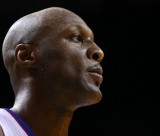
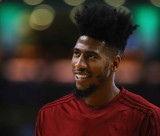

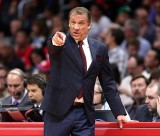











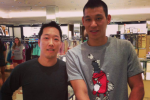
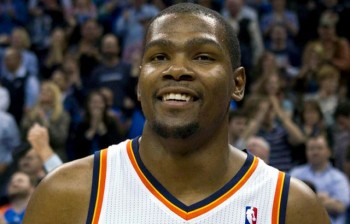

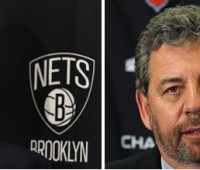
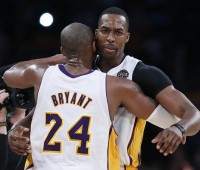




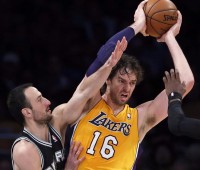



Join the Conversation